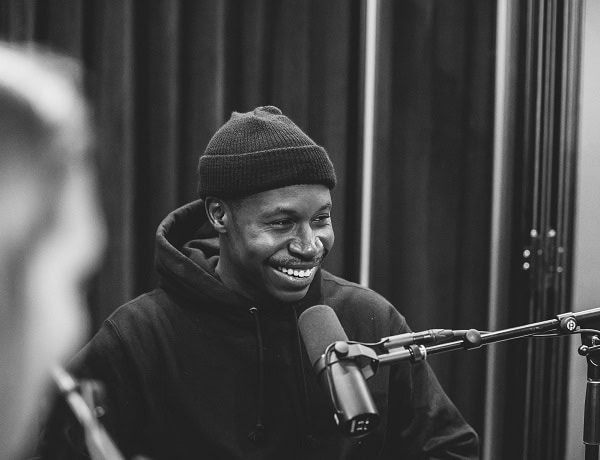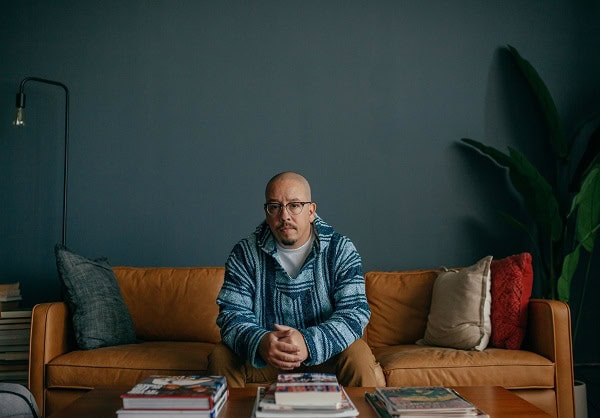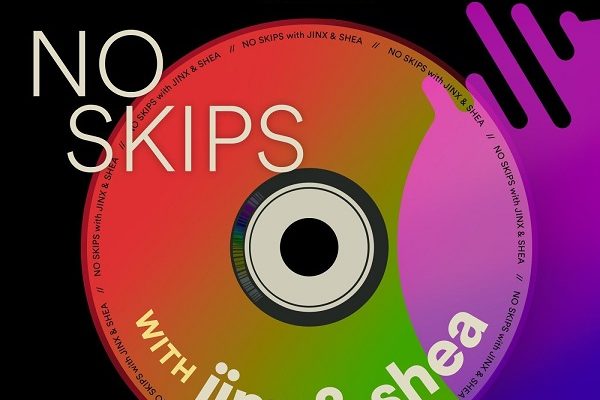Shea Serrano and Brandon “Jinx” Jenkins are two of the sharpest minds in Hip-Hop, and they combined for one of the best podcasts out, No Skips. The new series breaks down key and classic moments throughout ears in Hip-Hop history.
In the latest episode of No Skips, Shea and Jinx tackle Ready to Die, the debut album by one of the greatest emcees of all time, The Notorious B.I.G., which spawned classic hits like “Big Poppa,” “Juicy,” and more.
No Skips’ Ready to Die episode closes Volume 2, a run that explored Megan Thee Stallion’s Fever, Mos Def’s Black on Both Sides, A Tribe Called Quest’s Low End Theory, and additional staples. In this episode, the crew examines historic Biggie lines, the features of Puff Daddy and Method Man, the cover art, iconic stories, and more.
Ahead of the episode’s release, Shea and Jinx connected with The Source to detail coming together, what’s next for No Skips, and more.
The Source: We are 26 episodes in on No Skips. How hard was it to establish that groove? And what steps did you take to create that audio synergy between you guys?
Jinx: Shea flew out to my house and he kept ringing my doorbell. I’m like, who is this? [laughs]
No, seriously, if you’re on Twitter, you know who Shea is. And the way Twitter is, we all come up watching and reading, and after a while, you kind of become Twitter friends. Cause we’re all talking about rap and other stuff that we like. That just sort of extended into the podcast. We’ve never actually met. We’ve never been in the same room in real life, which is crazy.
Shea: He’s in New York. I’m in Texas. I think that helped out a bunch because, like Brandon is saying, I only knew him from Twitter from watching his videos on YouTube. But just through watching those, I feel like I knew Brandon. So instantly, there was a connection, and you can comment on a thing, and they could be like, oh yeah, this part of that thing. But also, we practiced a bunch. We recorded a bunch of episodes that never even made it out, like hours and hours of footage—just trying to figure it out. Where does Brandon like to get the ball? Where do I like to get the ball? And it also evolved in real-time. If you go to the earlier ones, you can see we’re trying to figure out the structure, and now we know how to flow and overlap the structure. And we’ve added Deena and Kerm, so it’s like all four of us making the chemistry.
In the previous episode, we got a dive into Megan Thee Stallion’s Fever, but I saw a request for albums following your Holiday break on your Twitter. Who do you decide when it’s time for an album?
Shea: That is an evolving argument. One of us will show up and be like, we should do this one. And then it’s like ‘Survivor’ where you have to convince the others to do the album. The one that’s coming out this week is Ready to Die. Everyone was like, “we’ve been waiting to do this one.” We knew we were going to do it. But other times, it’s like – me and Brandon got into a big argument about which Outkast album do we want to do? Do we want to do Aquemini? Do we want to do Southernplayalistic? Which one is it? And then neither one of us would back down. So Deena made us do Stankonia because the votes were split. So that’s just like a thing we argued back and forth about through text or in pre-production meetings. Last week I sent them a text as I was listening to My Krazy Life by YG, and I was like, we should make this album, this album rules. And Brandon agreed. But the other three were like, maybe we’ll do it. And now we have to convince them. We need a majority vote, you know?

The term classic album carries varying weight. What is that definition for either of you?
Jinx: I think there’s probably been stuff that maybe is landed on the spectrum. Some of us have been like, oh, it’s not like in my immediate list, but once you press play, you’re like, nah, this has to be heard. It has to be stuff you want to listen to. It’s weird to watch people sometimes argue on the Internet about what’s a classic because it’s supposed to be important. You have to want to like it. For us, man, it’s like, we’re ripping albums apart by lyrics, which I think is everyone’s barometer. But we also find funny shit in albums. We find what was happening around that album, which has a lot to say. There’s albums that dropped in the nineties that might not bang the same way today and stuff today that wouldn’t hold up back then. So it’s as much the context around it. And then the stuff we nitpick and find in between it can be anything from an insane skit to the stuff that was happening in that person’s life and even how they were able to make the album with that stuff going on.

You guys are heading into your are Ready to Die episode. For both of you, what is the earliest memory that you have of that album?
Shea: I was 13 at the time when that album came out. So the end of ’94, I didn’t listen to the whole album until early 95. This is when the songs would come a mile before the album. There was no way to get the album if you couldn’t get a ride to the mall. So I just found “Big Poppa” first, and that song was playing all of the time, and it was all I wanted to listen to. Eventually, I got my hands on a cassette version of it and just played the hell out of that. But yeah, I was 14, 13 years old at the time, and Biggie was such a force of personality. Like even just watching him on your screen. You’re like, I don’t know anything about this guy. I don’t know anything about the world, but I know that’s cool what he’s saying and how he’s saying it. What he’s doing is cool, and I want to be as much of this as I can.
Jinx: I was a little bit younger. I was like seven or eight, and it just kind of felt like it was always there. I had Hot 97. So, you know, Biggie was like a favorite. It was getting played like crazy. Growing up on the east coast, you just heard it all. It was just sort of in the oxygen. So I never really knew a world that didn’t have Biggie. He was a present force. And I knew I liked him. It’s so interesting when you get exposed to music when you’re like a child, a part of it will reach down and grab ahold of you. And oftentimes a rapper who can do that, it’s on purpose, like MC hammer, vanilla Ice, the beginning of pop-rap that was like aimed at 10-year-olds. Then when you become 14 and listen to it, you’re like, uh, no thanks. Biggie was like, he could reach down and grab, grab a kid. But then, when you were 14, you listened to the tape and heard a different part of it. And then, when you were 21, you heard a different part of it. And then, when you were 30, you listened to another part of it.
I don’t want to give away your full episode, but what is your favorite song from Ready to Die?
Jinx: So we do this thing in the episode; I say the song that I love and feel it in our conversation partially the way Shea sets it up. I’ll make a selection out of three, and then he’ll sell the hell out of number one. Then I’m like, what am I supposed to do? Like how do I pick the best song on this? Um,
Shea: We argued about it for like 30 minutes straight, just on that one on that one section. And then we did make a pick, but you have to listen to the episode.
You guys are hip-hop geniuses, but I know your ears expand into different genres. Have you had the thought of expanding No Skips?
Jinx: We talk about it every day. I think there are times where we’ve blurred the lines a little bit. When you get like Lauryn Hill, it’s a very Hip-Hop album. That’s the thing too. We say hip-hop; hip-hop is overarching like umbrella. So there’s things that fit in hip-hop that might be more melodic. But I know that all of us have this. We’ve talked about other genres far away from hip-hop because we love music.
Shea: As an idea, the structure of No Skips fits every kind of album. We could do Usher’s My Way and still do the best song. You still do the best guest feature. Non-music things are associated with the album. So yeah, we talk about it all the time. R&B is in second place right now. That’s the one we advocate for the most; we should do Blonde by Frank ocean or CTRL by SZA.
Looking back across these 26 episodes that you’ve done so far. Can you name a favorite conversation, episode, or argument you had?
Shea: You know what happens for me is anytime I go back and re-listen to any episode that we’ve done, and I hear it playing, I instantly say this was my favorite episode that we did. I’ll remember a joke that Brandon made or insight from Deena or something from Kerm. This morning before we recorded, I listened to the Megan Thee stallion where we had Sylvia Bell and Scottie Beam. And they were so good. They were like, get out of the way. It was like Shaq and Kobe. We turned into Rick Fox and Derek Fisher, like stand in the corners and let them run ISOs over and over again. They were so smart and so insightful and so funny. Right now, that’s my favorite one that I’ve listened to. But if I listen to another one, if I listen to the Missy one, I’m going to love that one. That’s just how it goes.
Jinx: I think about some of the earlier ones. I mean the first episode. I like the Get Rich or Die Tryin episode. We were figuring out the formula. Also, Lil Wayne’s Tha Carter 3 episode kind of feels like kind of a breakthrough one. Wayne is so ridiculous. He had Bobby Valentino sounded like a cop car. That’s nuts, like a vehicle, like what? But it kind of also showed me how we could pick albums too. Like how we can start to lay them out. Cause we went on a run. We did Kendrick, Lil Kim, and some albums are more ridiculous. Some are more literal. Some are more biographical. So that material gives us different stuff to play with. But that early run was fun because we didn’t know what we could do yet.
No Skips is currently available for you to listen to on Spotify.
